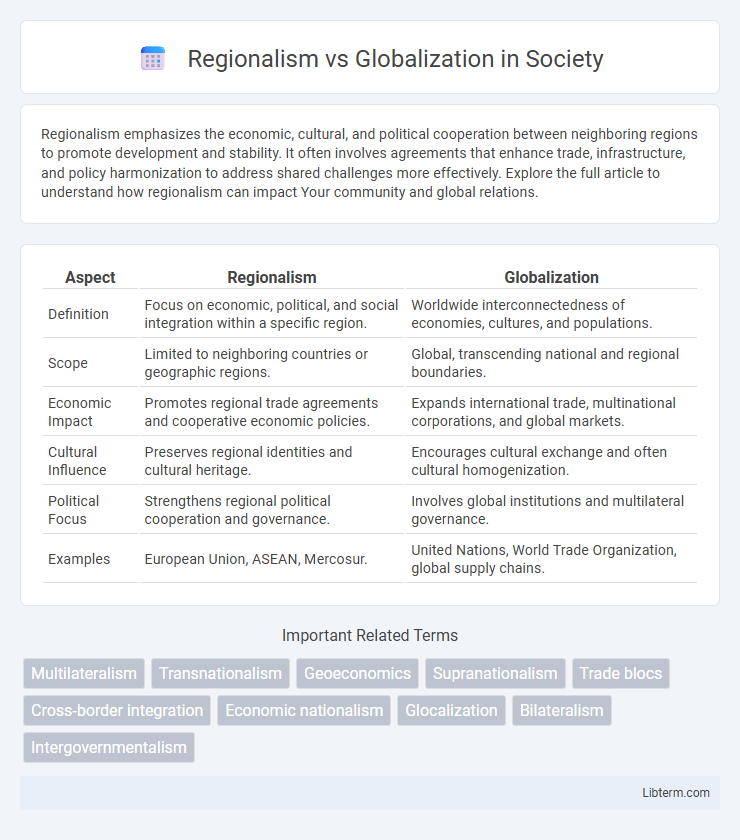Regionalism emphasizes the economic, cultural, and political cooperation between neighboring regions to promote development and stability. It often involves agreements that enhance trade, infrastructure, and policy harmonization to address shared challenges more effectively. Explore the full article to understand how regionalism can impact Your community and global relations.
Table of Comparison
| Aspect | Regionalism | Globalization |
|---|---|---|
| Definition | Focus on economic, political, and social integration within a specific region. | Worldwide interconnectedness of economies, cultures, and populations. |
| Scope | Limited to neighboring countries or geographic regions. | Global, transcending national and regional boundaries. |
| Economic Impact | Promotes regional trade agreements and cooperative economic policies. | Expands international trade, multinational corporations, and global markets. |
| Cultural Influence | Preserves regional identities and cultural heritage. | Encourages cultural exchange and often cultural homogenization. |
| Political Focus | Strengthens regional political cooperation and governance. | Involves global institutions and multilateral governance. |
| Examples | European Union, ASEAN, Mercosur. | United Nations, World Trade Organization, global supply chains. |
Introduction to Regionalism and Globalization
Regionalism emphasizes the political, economic, and cultural cooperation among neighboring countries to strengthen shared interests and collective identity. Globalization refers to the increasing interconnectedness and interdependence of countries through trade, technology, and cultural exchange on a global scale. Both concepts shape international relations, influencing economic policies, security strategies, and social dynamics worldwide.
Historical Evolution of Regionalism and Globalization
Regionalism has evolved as a response to political, economic, and cultural integration among neighboring countries, gaining prominence after World War II with the formation of blocs like the European Economic Community in 1957. Globalization accelerated markedly in the late 20th century due to advances in technology, trade liberalization, and multinational corporations expanding across borders. The historical evolution reveals regionalism often serves as a strategic step within the broader trend of globalization, balancing local interests with global economic interdependence.
Key Characteristics of Regionalism
Regionalism emphasizes the collaboration between neighboring countries to enhance economic, political, and cultural integration through formal agreements such as trade blocs, customs unions, and political alliances. It prioritizes localized decision-making, respects shared cultural and historical ties, and often involves protectionist policies to safeguard regional industries against global competition. Regionalism contrasts with globalization by focusing on regional identity and interdependence rather than worldwide integration and liberalized markets.
Key Features of Globalization
Globalization is characterized by the rapid integration of economies through international trade, investment, and technology transfer, fostering interconnected markets and cultural exchange. Multinational corporations and global supply chains play a pivotal role in driving economic interdependence among countries. Advances in communication and transportation technologies accelerate the diffusion of information, ideas, and innovation on a worldwide scale.
Economic Impacts: Regionalism vs Globalization
Regionalism fosters economic integration through trade agreements among neighboring countries, enhancing regional supply chains and boosting localized industries. Globalization expands access to international markets, driving economic growth by encouraging foreign investment, technology transfer, and diversified consumer bases. The balance between regionalism and globalization determines the dynamics of trade-offs between economic resilience and market expansion opportunities.
Political Dimensions and Sovereignty Issues
Regionalism emphasizes political cooperation among neighboring states to enhance collective sovereignty and policy harmonization, often through regional trade agreements and security alliances. Globalization challenges traditional sovereignty by promoting transnational governance structures, multinational corporations, and supranational institutions that can dilute state control. Sovereignty issues arise as states balance regional commitments with global integration, navigating tensions between maintaining autonomous decision-making and participating in broader political and economic networks.
Cultural Integration and Identity Challenges
Regionalism promotes cultural integration by reinforcing shared traditions, languages, and values within geographic areas, fostering a strong regional identity. Globalization challenges this by introducing diverse cultural influences that can dilute local customs and create identity conflicts among communities. Balancing regional cultural preservation with global interconnectedness remains critical for maintaining cultural coherence and social harmony.
Case Studies: Regional Blocs vs Global Organizations
Regional blocs like the European Union (EU) foster economic integration, political cooperation, and trade advantages among member states, demonstrating strong intra-regional cohesion. In contrast, global organizations such as the World Trade Organization (WTO) provide broad frameworks for international trade rules, facilitating cooperation across diverse economies but often facing challenges in enforcement and consensus-building. Case studies reveal that regional blocs can achieve deeper integration and tailored policies for regional needs, while global organizations prioritize inclusivity and standardized regulations across countries.
Opportunities and Challenges: Comparative Analysis
Regionalism fosters economic integration through trade blocs like the EU and ASEAN, boosting localized markets and cultural exchange while enhancing political cooperation. Globalization expands markets beyond borders, increasing access to diverse resources and innovation but exposes economies to global economic shocks and cultural homogenization. The challenge lies in balancing regional identities and economic benefits with the expansive reach and competitive pressures of globalization.
Future Prospects: Balancing Regionalism and Globalization
Future prospects for balancing regionalism and globalization emphasize integrating regional trade agreements with global economic frameworks to enhance stability and growth. Strengthening regional cooperation in infrastructure, technology, and sustainability can complement global supply chains and innovation networks. Policymakers must prioritize adaptive governance structures that respond to shifting geopolitical dynamics while fostering inclusive economic development.
Regionalism Infographic

 libterm.com
libterm.com